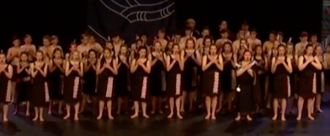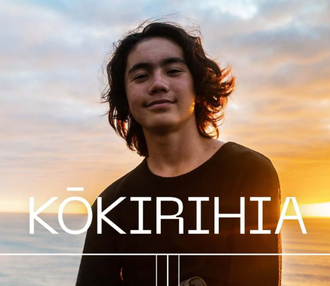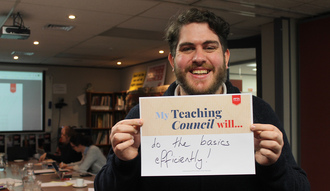-
Make Tertiary Education Free and AccessibleWHY A DEBT FREE FUTURE? Fulfilling these asks and a Debt Free Future is possible, in fact we’ve achieved it before – because education is a public good. Our country has a rich history of free tertiary education, for 121 years, until it was taken away in 1990. After lobbying from students and supporters across the motu, in 2017 we secured a promise of 3 years Fees Free from the Labour Party; but in 2020 the Government broke its promise to extend the policy and took this opportunity, this right, from learners. HOW CAN YOU HELP? We have the power to bring free and accessible education back, and we need your support. Sign and share this petition to be part of the movement fighting for a Debt Free Future. This is about people, community and doing what’s right.1,583 of 2,000 SignaturesCreated by VUWSA President
-
Compulsory Consent Education in SchoolsStudents deserve to have the tools to build healthy, consensual relationships. Due to the lack of comprehensive and consistent consent education in schools and kura across Aotearoa, rangatahi are leaving high school with a varying understanding of consent and its importance within interpersonal relationships. Sexual violence has become an epidemic among high school students in Aotearoa. Despite the significant level of sexual harm, consent education is merely ‘advisable’ under the national health curriculum. If we continue to remain complicit in our treatment of sexual abuse within high schools, we are failing our future generations. Learning the importance of consent is vital to the formation of healthy and safe relationships. The Ministry of Education can not afford to continue to leave consent education to chance. Almost half of the victims of sexual assault (47%) are between 15 and 29 years old. Reports also indicate that 50% of wahine Maori have experienced sexual assault or physical violence. Gay, Lesbian, and Bisexual individuals are more than twice as likely to experience sexual assault than heterosexual adults. Trans and non-binary experience higher rates of sexual violence than male and female populations (Te Aorerekua, 2020). Therefore, It is imperative to ensure our consent education policies are inclusive and are targeted to our rangatahi. Currently, in New Zealand, there is no legal requirement for high schools to teach their students about consent. The Ministry of Education Relationships and Sexuality Guidelines outline that consent education is crucial to students’ wellbeing and development, but the Ministry of Education has no specific auditing process to ensure schools are implementing these guidelines. After reviewing over 300 testimonies involving sexual harm and/or what education around consent they recieved from young people around Aotearoa, it is clear that our national consent education is severely inconsistent. Many submissions from students explained they felt their consent education was inadequate or received none at all. We want to ensure that our rangatahi are receiving the consent education they both need and deserve. The Guidelines envision a relatively high standard of consent education but have no means of ensuring that secondary schools actually implement it within their curriculum.4,124 of 5,000 SignaturesCreated by Genna Hawkins Boulton

-
Healthy Food and Drink in SchoolsWe believe that every child and young person in New Zealand deserves the best start to life and what they eat and drink is vital for optimal physical and mental health. Research in New Zealand has highlighted ‘free sugars’ as contributing significantly to high rates of poor physical health, poor oral health, diabetes and other health-related diseases.[1] The consumption of free sugars in sugar sweetened beverages contributes to 26% of the total sugar intake of children.[2] Studies conducted by the Environmental Health Indicators New Zealand (EHINZ) note that dental decay is now the most common disease reported among children in New Zealand. But sugary drinks are not the only problem. The food our children eat also needs to be healthy and nourishing. Research has demonstrated that children who eat healthy food are better behaved and better able to concentrate in class and learn.[3] Education is key to improving health outcomes in our community and schools need to lead the way. Promoting healthy food and then selling unhealthy food in our school canteens does not make sense. We already have Healthy Food Guidelines, Schools need to be given the duty and support to implement them. [4] For more information, please contact: Shona Jaunas (President Open Forum for Health Information) [email protected] https://www.openforumforhealthinformation.com/nz-schools-consultation [1] Free sugars are defined by the World Health Organisation as monosaccharides and disaccharides added to food by both the manufacturer and consumer, including sugars naturally present in honey, syrups, and fruit juice. [2] Sundborn et al, “New Zealand’s growing thirst for a sugar-sweetened beverage tax”, New Zealand Medical Journal, 2015. [3] Rucklidge and Kaplan, “The Better Brain, How Nutrition Will Help You Overcome Anxiety, Depression, ADHD and Stress, Vermillion, 2021 [4] 20210927-Nutrition-Guidance-Formatted-FINAL.pdf (education.govt.nz)1,368 of 2,000 SignaturesCreated by Open Forum for Health Information New Zealand
-
Make Civics Education a Core Subject in All New Zealand Secondary Schools.In New Zealand, we have less social cohesion, lowering levels of trust in the government and lowering voter turnout rates. These are urgent matters that require action. We believe it requires implementing education and training within schools so young people have the ability to learn before they are able to actively engage and understand how decisions are made. We believe this is one crucial action that will work towards a more democratic society. The 2020 general election showed that 78% of eligible voters from the age of 18 – 24 voted compared to 89.14% of eligible voters between the age of 65 – 69. The 2019 local body election showed that only 41.7% of all eligible voters voted. We can do better as a country. There is currently a School Leavers Toolkit (https://school-leavers-toolkit.education.govt.nz/en/government-and-voting/) which was announced by the Labour Government in 2019 as a resource to equip students with the core skills and knowledge they need to leave school. We agree with Chris Hipkins when he said “This is just a start” and while we appreciate the MoE acknowledging civics education is an integral part of a person's education. We want civics education in all New Zealad schools to be the end goal. We urge the Ministry of Education to create richer content to be taught in secondary schools in a way that is engaging, experiential and participatory whilst maintaining an apolitical tone that enables people to question and explore their own beliefs and values. “We need to make sure all our young people can leave school with the skills they need to get on in life…It shouldn’t be left to chance” – Chris Hipkins Civics in Schools is a group of passionate people who have a vision where every New Zealander is an active participant within our democratic processes. We want every person to have the tools and knowledge to vote, make informed decisions and effect change. We are a multi-generational group of people, campaigning and calling on Minister of Education – Hon Chris Hipkins, Associate Minister of Education – Jan Tinette, Associate Minister of Education (Māori Education) – Hon Kelvin Davis, Associate Minister of Education (Pacific Peoples) – Hon Aupito William Sio to make civics education a core subject within all New Zealand secondary schools. Civics in Schools in the media: https://www.stuff.co.nz/national/politics/local-government/127970420/petition-created-to-teach-civics-in-schools https://www.rnz.co.nz/national/programmes/afternoons/audio/2018834600/call-for-civics-to-be-a-core-subject-in-school-curricula591 of 600 SignaturesCreated by Joni Tomsett

-
Equal access to resources for all studentsThe Ministry of Education’s purpose is to shape an education system that delivers equitable and excellent outcomes for children and young people, and a strong theme from the Prime Minister is that we need to maintain momentum to close the digital divide, and address equity issues in education. Resolving digital inequality will underpin the stronger, fairer education system that is central to Labour Government policy. As of July 2021, only 910 out of approximately 2,500 schools are copyright compliant with a licence, while the balance either cannot afford the licence or are unaware of their legal obligations or consequences. This means that there are approximately 500,000 students in schools without a copyright licence. These students are either deprived of access to one or more media forms of these pedagogically vital resources, or their teachers are inadvertently in breach of copyright law in using these forms of content illegally. In New Zealand copyright licences are purchased by each individual school on a voluntary basis, as directed by their Board of Trustees. In Australia and the UK licences are purchased for schools by their respective governments. There, online resource centres that deliver licensed material to schools make it easy and cost effective to access the broad array of curated educational content. This petition asks the Minister of Finance and the Minister of Education to abandon the current school by school licence environment, created under the ‘Tomorrow’s Schools’ policy, and fund an all schools copyright licence for the benefit of our students and teachers. The Principal of Onehunga High School in Auckland, Deirde Shea, embodies the ethical and moral approach to copyright compliance. “Being licensed is the right thing to do in every sense of the word,” she says, “not only for our students and teachers to access and share more content, but what’s equally important is supporting the people that create the work. Because without those people creating content, we wouldn’t have the resources to teach the youth of New Zealand.” Quote from an article which originally appeared on EducationCentral.co.nz, 26 June 2019588 of 600 SignaturesCreated by Martin Drew
-
End library book fines in ŌtautahiThere is "...no evidence that library overdue charges are an incentive for returning items on time. The experience of libraries in New Zealand and overseas is that overdue charges are a more effective deterrent and barrier to library usage, disproportionately impacting members of the community on lower and fixed incomes." (1). This change is important as it will bring Ōtautahi up to par with its peers across Aotearoa including Auckland, Carterton, Clutha, Dunedin, Masterton, Nelson, Selwyn, South Taranaki, South Wairarapa, Stratford, Upper Hutt, Waikato and Waimakariri that have, and or are removing these fines because evidence does not support that they work, and that they create barriers to access and learning. We have also seen post lockdown when the Council encouraged people to return books with a fee waiver we did, lets now make that permanent (2). (1). Report to Dunedin City Council from 27 October 2021 when they decided in favour- https://infocouncil.dunedin.govt.nz/Open/2021/10/CNL_20211027_AGN_1542_AT.PDF (2). https://newsline.ccc.govt.nz/news/story/libraries-issue-call-to-return-overdue-books295 of 300 SignaturesCreated by Josiah Tualamali'i
-
Urgently stop National Library from sending thousands of books to the PhilippinesThis petition was closed Nov 1st and presented to the House of Representatives Nov 22 More info on the Parliament-site https://www.parliament.nz/en/pb/petitions/document/PET_116636/petition-of-sandra-bianciardi-urgently-stop-national-library Because the parliamentary submission (presented on January 20th) appears to have stalled, we have decided to take the unusual step of publishing our submission. You may download the submission here: http://alpha.books.online.fr/Submission-20-1-2023.pdf December 2021, Rachel Esson announced the suspension of disposals, and we learned later on in February through the Dominion and Stuff that "consultations" were to happen with the "stakeholders". But in reality nothing has happened over the last 6 months: eventually in July this year, Rachel Esson, clearly confirmed to an OIA inquiry that the agreement with Internet Archive has NOT been cancelled or modified. https://fyi.org.nz/request/19611-internet-archive-agreement-and-update-of-the-list-of-books-to-be-sent-to-the-philippines#incoming-74684 The list of 428,232 books destined to be digitised in the Philippines and leave New Zealand forever, is the same list as it was before Christmas 2021. Nothing allows us to believe that a discussion will openly take place, on the contrary, the National Library's declaration indicates it is going in exactly the opposite direction. Let’s read once more what R. Esson expressed in Stuff: “People care so passionately. But the world’s moved on, and we don’t need to keep these [books],” she says. “It’s not good for New Zealand, and for us, to keep them. And they’re not being used. And they’re available elsewhere. All those arguments. We’ll find a way through, but I’m not sure that we can please everyone.” (Stuff, https://www.stuff.co.nz/entertainment/books/127618485/help-us-the-national-librarys-unsolvable-dilemma) Therefore, this petition is still as relevant as it was in its first days when it was launched by writers gathering at St Peter's Willis St, in DomStuff Nov 11, 2021. The voices heard at the event were very clear : https://www.stuff.co.nz/national/126965961/authors-gather-for-literary-protest-against-national-librarys-internet-archive-deal or check out Karyn Hay’s LATELY for a live cross just after the event https://www.rnz.co.nz/national/programmes/lately/audio/2018820187/authors-protest-national-library-book-disposal-in-wellington Here’s what you can do: Have a look and share your ideas on the facebook page "Writers Against National Library Disposals" https://www.facebook.com/groups/nodisposals Take a look at the list. Just scroll down to (or seek using Find) "Download the list of books": https://natlib.govt.nz/about-us/strategy-and-policy/collections-policy/overseas-published-collection-management the very identity and function of a National Library is called into question by its donation of the books to an overseas organisation, with no hope of ever recovering them. Therefore this petition not only asks for the Internet-Archive agreement to be cancelled, but also for public consultation about the future of the National Library of New Zealand, a library where professional librarians will be able to fill the collection with any books of the world they judge pertinent to New Zealand researchers and the public. "Who is Responsible" https://nodisposals.neocities.org/html/Who-Is-Responsible.html https://nodisposals.neocities.org/html/Situation-end-2021.html What has happened: Two years ago the National Library announced a plan to rid itself of most of its Overseas Published Collection. These books are national assets and should be treated this way. They contain a wealth of knowledge we do not want to lose. They will be costly to replace, and some will not be able to be replaced. Researchers, writers and students use this collection regularly. ▪︎ Over 600 000 books were initially slated for "secure destruction " by the National Library. ▪︎ The National Library's own statistics show these books are used about as much as any other part of the National Library's collection. ▪︎ 57 000 of the books were sent to a massive book sale at Trentham earlier this year. Approximately 10 000 sold. ▪︎ The National Library has entered into a contract to gift 428 000 books to an American company, Internet Archive, in return for digitising the books. The books will never come back again ▪︎ Internet Archive is facing a major lawsuit alleging breach of copyright in the USA and is opposed by writers and publishers groups nationally and internationally The National Library's rationale for getting rid of the books has shifted over time. ▪︎ It started as a cost saving exercise so it did not have to pay for storing them. "Secure destruction " was its original plan. Publishers figures for 2019 showed 2662 books were published in New Zealand. It would take 150 years to fill the space left by getting rid of the Overseas Published Collection. Extract from Scoop. 29 Oct "All the hard work of thoughtful librarians, their acquisitions and curation over the past century (and more), will be undone. The National Library is descended from the General Assembly Library, founded in 1862. (...) The books are part of our tradition. They are special items, not worthless, ageing assets – and their value is increasing with time. All attempts to persuade our politicians (...) have failed until now. These politicians, through the library’s directors, are effectively ‘legislating’ (in the philosophical sense) against our books. Public outcry is now our recourse." William Direen https://wellington.scoop.co.nz/?p=140249&fbclid=IwAR1tsZqoZ9uxsOyUS_acm17hmVrSgCJYMkcHqEUIDyMpiB263ZVJh5nNVRE We ask that ▪︎The contract with Internet Archive be cancelled Parliament must ensure that the National Library carries out its job in a careful, prudent way as envisaged by those who drafted the legislation it currently operates under.1,024 of 2,000 SignaturesCreated by Sandra Bianciardi
-
Give Students a Course Related Costs Increase due to LockdownLast year during level four lockdown students were given the ability to borrow an extra $1000 against their student loan for course related costs. For many students this provided a lifeline and peace of mind in a time of great financial insecurity. Lockdown often creates extra costs for students in terms of equipment needed to study at home, extra power and heating bills etc while simultaneously causing many students to have less income coming in. We have been in level four lockdown for two weeks with Auckland just announced as having at least two more weeks of level four. However the government has not increased course related costs or provided any direct support to students. This needs to change.65 of 100 SignaturesCreated by Bronte Page
-
Careers in Kapa HakaThe current issue with recruiting and the retention of qualified and professional kapa haka tutors in schools is a serious concern… Tamariki love kapa haka! The number of students who are participating and passionate about kapa haka is growing all the time! The student's knowledge of Te Reo me ona Tikanga Māori and confidence grow as they learn waiata, haka and other skills. We have seen improvements in the attendance and engagement of many students through a good quality kapa haka group. But finding the right people to fulfil that teaching role is a major and ongoing struggle. The Problem for Kura... As a national education priority (NEG 9 and NEG 10), the ability to find affordable, suitable and committed tutors shouldn't be so difficult. Schools are scrambling around every year to find professional tutors. On more than one occasion we have had people commit to tutoring our groups and then pull out in week one, term one! The anxiety this induces when you have up to 140 kids sitting in a hall ready to learn kapa haka is intense! The solution to this has been employing independent professional tutors. However, they are expensive, especially for smaller schools. Furthermore, the pull between priority curriculum areas and funding Māori performing arts is difficult for principals and boards of trustees. Funding is often prioritised to literacy and numeracy, science and technology, PE and LEOTC (NEG 5). The responsibility for funding Māori Performing Arts is a choice that should not be on the heads of individual principals and boards. As we are bound by Te Tiriti o Waitangi (Article Two), to protect this taonga and this should be done at a national level. Tutors are hard to find and relying on whānau to do the teaching of kapa haka is neither a respectful nor a sustainable option. Once you do find a volunteer (or someone who does the job for koha) the retention of tutors is difficult, life circumstances change for volunteers, more financially viable opportunities come up, new educational opportunities arise and family commitments, at times, take precedent. Many tutors cannot commit (for free) long-term to a school program. The problem for professional tutors... To run a free-market-style business funded by schools can be difficult for kapa haka experts. Particularly in relation to supporting families and maintaining a start-up business model or in the long term. Tutors can only charge what schools can afford and need to do all the mahi of running a business, understanding finances and organsing amongst many schools. They, therefore, need to have a certain amount of energy, confidence, and know-how to take these risks to manage this effectively. This is not an easy model for many people to set-up and run long term. As stated previously, schools are left to rely on whānau who volunteer or are given koha. This often puts pressure on whānau who have their own work and family commitments. It is not respectful to ask for so much for free, in a world where money is the formal acknowledgment of value. This feels disrespectful and is disheartening, to say the least for those who are asked to give so much for so little. On top of that, some tutors may not have the teaching skills required and it can be a daunting task for a whanau member (or two) to tutor a large group of children. There is usually little or no teaching training for these people and it can be seriously challenging for them. In summary, there are few or no professional and secure career pathways for people skilled in kapa haka. We need to create a system where people can achieve success in a Māori world and then have that honored with financial stability and security in the wider community. In short, the current system is not respectful of Māori mahi or the enormous value and importance placed on kapa haka by our tamariki. The schools are doing the best they can to fill this gap, but it shouldn't be this difficult to honour our commitments to Te Reo me Ona Tikanga Māori, me, Te Tiriti o Waitangi. We are calling that the taonga of kapa haka is protected through supported career pathways, that our tamariki have no obstacles to participation and that the Government and Iwi in partnership have a discussion and make a plan to implement structures for a long term tautoko of kapa haka. So join us to fight for paid professional kapa haka tutors in every school!333 of 400 SignaturesCreated by Anna-Marie Stewart
-
Rename Colonial Street Signs in Kirikiriroa/Hamilton City.This is important because street signs must be names of people who have up-held honor and integrity in their lives. They must be those who were role models and mentors, so our children and community can grow a sense of pride for themselves, in the same way: selfless and serving. Instead, we have names of those who committed violent crimes of theft and murder against women, children and the elderly. Bryce Street, Cameron Street, Grey Street and Von Tempsky Street must be among the first street signs to be removed. They are cruel reminders "of the devastating effects of British imperialism and its continous impact on Maori" (Pokere-Phillips, 2020). And which impact affects ALL New Zealanders. Please act now!57 of 100 SignaturesCreated by Jacquelyn Elkington
-
End school streaming - let all our tamariki thriveAs a nation we pride ourselves on being fair. We want to believe that no matter where you are born or into what circumstances, we all have an equal opportunity to achieve our potential. But right now, an unfair practice that divides and labels tamariki (children) from the very first day they arrive at school is standing in the way of that vision. This practice is known as streaming. It’s often called ‘in-class grouping’ in primary schools and ‘banding’ in secondary schools. At primary school, children are put into groups for reading or maths. The top groups get more challenging work, more teacher time and higher expectations. Being put in the bottom class takes away children’s motivation and self-belief. They begin to think of themselves as less clever or capable. Streaming is a systemic barrier to Māori success that operates at every level in our schools, particularly in mathematics and science. Our research has found streaming is one of the most significant barriers to future success, pushing rangatahi off course.[1,2] Streaming can determine the pathways available to kids long after the decision is made. Many students who were told they’re low ability, do not or cannot enter full NCEA courses. The impact of streaming narrows career choices to low skill, low paid, and high risk jobs and employment. We know that it is bad for everybody, but it is especially bad for Māori and Pasifika students. This is systemic racism in action. Ending streaming is one small step that will have a huge outcome for the futures of our rangatahi. An increasing number of schools around Aotearoa have decided to run mixed ability classrooms with incredible results. These schools have all used alternative ways of teaching and have seen students do better academically, especially Māori and Pasifika students. They used tools that brought teachers and students closer together - like learning more about each child’s passions and goals for maths, and scrapping arbitrary deadlines to assess students when they were ready. Academic achievement improves across the board, kids’ self-belief, motivation and aspirations soar, and social and ethnic barriers amongst the students decline. We need the government to step up to support an equitable education system that enables all rangatahi to be inspired by their future, confident in their culture, thriving in their work and empowered to succeed. Add your name today to join us in calling on the government to end streaming in schools and stand up for our tamariki! This is a movement led by Tokona Te Raki - The Maori Futures Collective http://www.maorifutures.co.nz/. *** [1] He Awa Ara Rau - A journey of many paths, 2019 https://knowledgeauckland.org.nz/media/1902/he-awa-ara-rau-a-journey-of-many-paths-berl-tsi-et-al-nov-2019.pdf [2] End streaming in Aotearoa, 2021 https://www.growwaitaha.co.nz/media/2173/ending-streaming-in-aotearoa-final.pdf [3] Kōkirihia, 2024 https://tokona-wp.s3.amazonaws.com/uploads/2022/12/Ko%CC%84kirihia-Final-1.pdf4,075 of 5,000 SignaturesCreated by Philip Prendergast
-
Create a Teaching Council that works for teachersThe teaching profession has been facing a supply crisis for a long time. Attracting and retaining quality teachers is paramount if we are going to maintain the high standards of teaching and learning that New Zealanders expect and deserve. The pressures of the job are already such that young graduates and those considering a career change feel they can earn better money and have a better work-life balance elsewhere. Having to cover the cost of a registration and certification personally – unlike nurses or social workers, for instance, whose registration costs are covered by their employers – is another barrier that the profession cannot afford. Teachers deserve a Teaching Council that they can trust, and that trusts them. If we are to keep the profession to the world-leading standard that it is today, we must honour that with fair fees, a high-trust model of certification, and a Council that performs its core functions effectively and efficiently. Nothing more, and nothing less.3,443 of 4,000 SignaturesCreated by Chris Abercrombie

.png)


.png)







